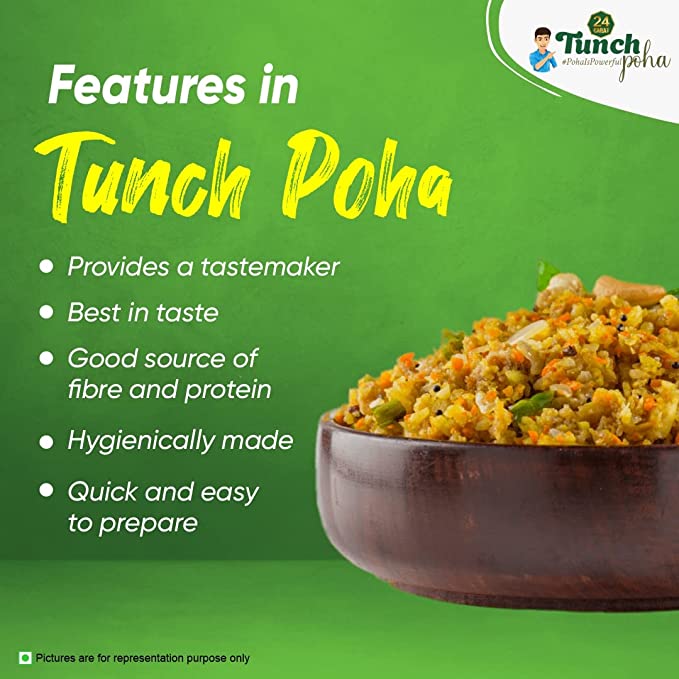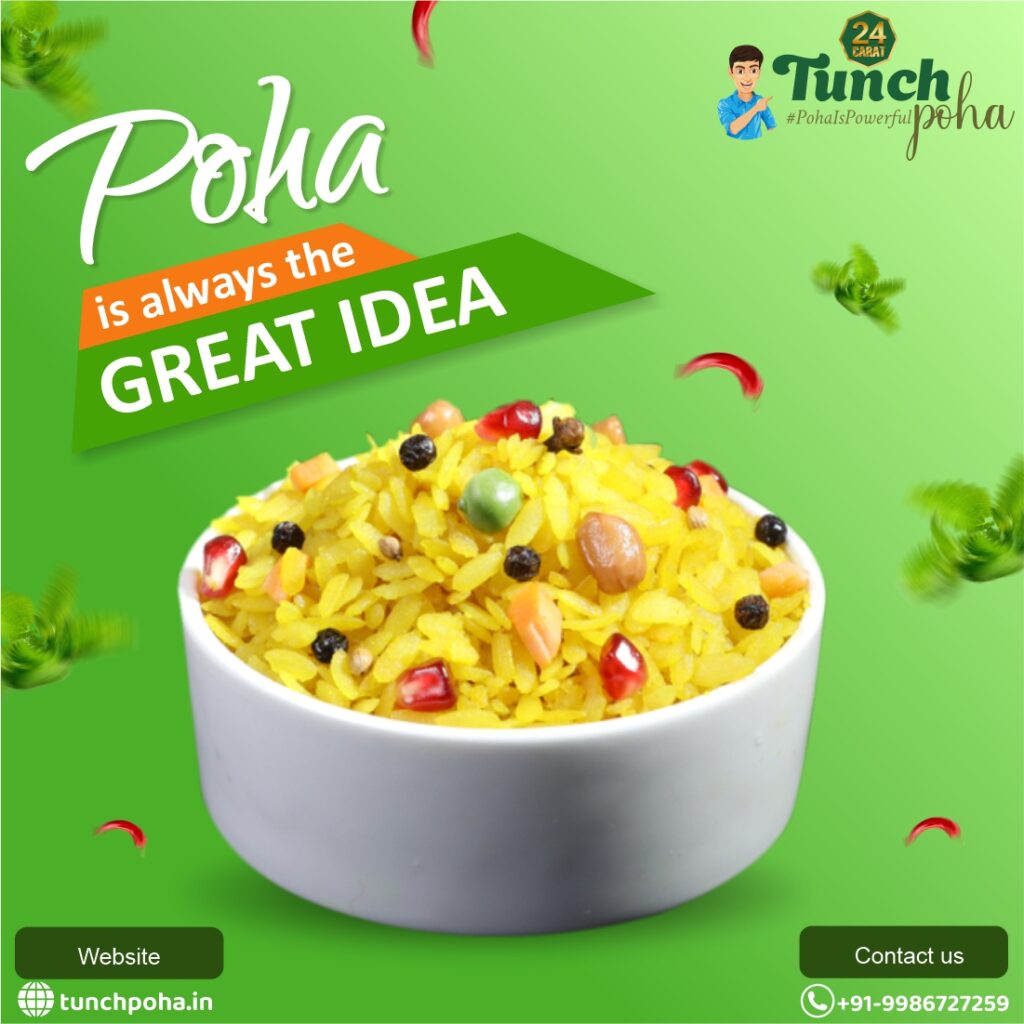
Gluten Free Breakfast for a Healthy Start – Tunch Poha
Introduction(Gluten Free Breakfast):
In the diverse landscape of Indian breakfast options, one dish that stands out for its simplicity, flavor, and gluten-free nature is Tunch Poha.
This popular breakfast choice has gained popularity across the country due to its ease of preparation and delightful taste.
In this article, we will delve deeper into the wonders of Tunch Poha as a gluten-free breakfast option, exploring its nutritional benefits, the cultural significance of the dish, and some exciting variations to make it even more enticing.
The Gluten-Free Wonder:
For individuals with gluten sensitivities or those following a gluten free breakfast , Tunch Poha is a perfect choice. Unlike many other breakfast options that contain wheat or other gluten-containing grains, Tunch Poha is made from flattened rice flakes, which are naturally free from gluten.
This makes it a safe and delicious choice for those with celiac disease or gluten intolerance, allowing them to enjoy a fulfilling and flavorsome breakfast without any worries.
Nutritional Benefits:
Apart from being gluten-free, Tunch Poha also offers several nutritional benefits. It is low in calories, making it a suitable option for those aiming to maintain a healthy weight.
The rice flakes used in Tunch Poha are a good source of carbohydrates, providing the essential energy to kick-start your day.
Additionally, poha is a rich source of iron, an important mineral required for healthy red blood cells and oxygen transport in the body. It also contains essential vitamins such as vitamin B, which aids in metabolism and energy production.
Moreover, poha is known to contain antioxidants that help combat free radicals, promoting overall well-being.
Cultural Significance:
Tunch Poha is a staple breakfast dish, it is often enjoyed with a steaming cup of tea.
The preparation and consumption of Tunch Poha have become part of the region’s rich culinary heritage, passed down through generations. It is a symbol of comfort, simplicity, and warm hospitality.
Families often gather around the breakfast table to savor this traditional dish, sharing stories and creating lasting memories.
Its popularity has extended far with people across India embracing its unique flavors.
Preparation and Ingredients:
The process of preparing Tunch Poha is relatively simple, requiring minimal time and effort. The key ingredient, flattened rice flakes, is readily available in most grocery stores, making it convenient to incorporate into your breakfast routine. To make Tunch Poha, start by rinsing the flattened rice flakes gently to remove any impurities.
Then, soak them briefly in water until they soften. Meanwhile, heat some oil in a pan and add mustard seeds, cumin seeds, curry leaves, chopped onions, green chilies, and turmeric powder for a burst of flavor.
Sauté the mixture until the onions turn translucent, then add the soaked flattened rice flakes and stir well. Season with salt, garnish with fresh coriander leaves, and your Tunch Poha is ready to be savored!
Benefits of Gluten Free Breakfast:
A gluten-free breakfast offers several benefits for individuals with gluten sensitivities, celiac disease, or those following a gluten-free diet. Here are some key benefits:
- Digestive Health: Gluten is a protein found in wheat, barley, and rye, which can be difficult to digest for some individuals. Consuming gluten-containing foods can cause digestive discomfort, bloating, and other gastrointestinal symptoms. Opting for a gluten-free breakfast helps alleviate these issues and promotes better digestive health.
- Celiac Disease Management: Celiac disease is an autoimmune disorder triggered by gluten consumption. In individuals with celiac disease, gluten damages the small intestine and interferes with nutrient absorption. A gluten-free breakfast is crucial for managing celiac disease, as it eliminates gluten and allows the intestine to heal, improving overall health and well-being.
- Increased Energy Levels: Gluten-free breakfast options often include nutrient-rich foods such as fruits, vegetables, lean proteins, and whole grains like quinoa or gluten-free oats. These foods provide a steady supply of energy, keeping you energized throughout the morning and preventing energy crashes often associated with processed, gluten-laden breakfast options.
- Weight Management: Many gluten-free breakfast options focus on whole, unprocessed foods, which tend to be lower in calories and higher in fiber. This combination helps regulate appetite, promote satiety, and prevent overeating, aiding in weight management and supporting a healthy body weight.
- Nutritional Variety: A gluten-free breakfast encourages diversifying your food choices. By avoiding gluten-containing grains, you’re more likely to explore alternative grains and ingredients, such as quinoa, millet, rice, almond flour, or coconut flour. This promotes a varied and nutritious diet, ensuring you receive a wider range of essential vitamins, minerals, and antioxidants.
- Improved Nutrient Absorption: In individuals with gluten sensitivities or celiac disease, the presence of gluten can impair nutrient absorption in the intestines. By eliminating gluten from the breakfast meal, nutrient absorption can improve, leading to better overall nutrition and optimal health.
- Allergy Management: Some individuals may have gluten allergies or sensitivities that can trigger allergic reactions or worsen existing conditions such as asthma or eczema. Adopting a gluten-free breakfast reduces the risk of allergic reactions and contributes to better allergy management.
- Exploration of Alternative Ingredients: Embracing a gluten-free breakfast introduces you to new and innovative ingredients, allowing you to experiment with different flavors and textures. This can expand your culinary repertoire and make breakfast more exciting and enjoyable.
A gluten-free breakfast offers several benefits for individuals with gluten sensitivities, celiac disease, or those following a gluten-free diet. Here are some key benefits:
- Digestive Health: Gluten is a protein found in wheat, barley, and rye, which can be difficult to digest for some individuals. Consuming gluten-containing foods can cause digestive discomfort, bloating, and other gastrointestinal symptoms. Opting for a gluten-free breakfast helps alleviate these issues and promotes better digestive health.
- Celiac Disease Management: Celiac disease is an autoimmune disorder triggered by gluten consumption. In individuals with celiac disease, gluten damages the small intestine and interferes with nutrient absorption. A gluten-free breakfast is crucial for managing celiac disease, as it eliminates gluten and allows the intestine to heal, improving overall health and well-being.
- Increased Energy Levels: Gluten-free breakfast options often include nutrient-rich foods such as fruits, vegetables, lean proteins, and whole grains like quinoa or gluten-free oats. These foods provide a steady supply of energy, keeping you energized throughout the morning and preventing energy crashes often associated with processed, gluten-laden breakfast options.
- Weight Management: Many gluten-free breakfast options focus on whole, unprocessed foods, which tend to be lower in calories and higher in fiber. This combination helps regulate appetite, promote satiety, and prevent overeating, aiding in weight management and supporting a healthy body weight.
- Nutritional Variety: A gluten-free breakfast encourages diversifying your food choices. By avoiding gluten-containing grains, you’re more likely to explore alternative grains and ingredients, such as quinoa, millet, rice, almond flour, or coconut flour. This promotes a varied and nutritious diet, ensuring you receive a wider range of essential vitamins, minerals, and antioxidants.
- Improved Nutrient Absorption: In individuals with gluten sensitivities or celiac disease, the presence of gluten can impair nutrient absorption in the intestines. By eliminating gluten from the breakfast meal, nutrient absorption can improve, leading to better overall nutrition and optimal health.
- Allergy Management: Some individuals may have gluten allergies or sensitivities that can trigger allergic reactions or worsen existing conditions such as asthma or eczema. Adopting a gluten-free breakfast reduces the risk of allergic reactions and contributes to better allergy management.
- Exploration of Alternative Ingredients: Embracing a gluten-free breakfast introduces you to new and innovative ingredients, allowing you to experiment with different flavors and textures. This can expand your culinary repertoire and make breakfast more exciting and enjoyable.
Variations:
While the classic Tunch Poha recipe is delightful on its own, there are several variations that can add a twist to your breakfast routine.
These variations not only enhance the taste but also offer additional nutritional benefits. Here are a few popular ones:
- Vegetable Poha: Enhance the nutritional value of Tunch Poha by adding finely chopped vegetables such as carrots, peas, bell peppers, and beans. This variation adds a colorful touch to your plate while boosting the fiber content, vitamins, and minerals.
- Peanut Poha: For a crunchy and protein-rich twist, incorporate roasted peanuts into your Tunch Poha. The combination of textures and flavors elevates the dish to a new level, providing a satisfying and nutritious breakfast option.
- Lemon Poha: Squeeze some fresh lemon juice over your Tunch Poha for a tangy and refreshing taste. This variation adds a zesty kick to your morning meal, awakening your senses and providing a burst of vitamin C.
- Spicy Poha: If you enjoy bold flavors, consider adding spices like red chili powder, garam masala, or a dash of black pepper to your Tunch Poha. This variation adds a fiery kick, making it an ideal choice for those who prefer a spicier breakfast experience.
Conclusion:
Tunch Poha, with its gluten-free nature, delightful taste, and rich cultural heritage, has rightfully earned its place as a popular breakfast option.
It offers a nutritious and fulfilling start to the day, making it suitable for individuals with gluten sensitivities or those following a gluten-free diet.
With its simple preparation and a range of variations, Tunch Poha allows for creativity and customization to suit individual preferences. So, embrace this traditional Maharashtrian dish and indulge in a gluten-free breakfast that is both satisfying and flavorsome.
Let Tunch Poha become a cherished part of your morning routine, filling your day with warmth, nourishment, and the vibrant flavors of India.
Also read – Best Rice Flakes




